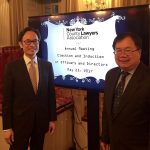Here is the intro video for Glenn Lau-Kee when he was honored back in April during the Museum of Chinese in America’s Celebration of Community Heroes. The video mentions Glenn’s leadership as AABANY President (1997-98) and as the first Asian American President of the New York State Bar Association (2014-15). AABANY Executive Director Yang Chen appears in the video, along with other community leaders, to salute Glenn and his contributions to not just the Asian American community but the larger community as well. Thank you, Glenn, for all that you do. You are truly an inspiration to us all and a genuine Community Hero. Congratulations, again!
Super Lawyers – The Top Women Attorneys New York Metro 2017 – 1
Super Lawyers – The Top Women Attorneys New York Metro 2017 – 1
AABANY congratulates the AABANY members who have been named Top Women Super Lawyers and Rising Stars in the New York Metro 2017 edition.
Both recognitions of Super Lawyer and Rising Star involve a very selective and intense process in which the selected attorney is nominated and approved by his or her peers in the same area of practice.
Selections are made on an annual basis. Only 5% of attorneys are recognized as Super Lawyers, and only 2.5% of attorneys under 40 years of age are selected as Rising Stars. The attorney must prove to be ethical, have excellent client records and proven results. The 2017 digital edition of Super Lawyer and Rising Star can be found by following the link in the title.
Congratulations to you all on your efforts and achievements!
New York Metro Women Super Lawyers
- Kathy Chin, Cadwalader, Wickersham & Taft (leader of AABANY Trial Reenactment team)
- Ching-Lee Fukuda, Sidley Austin
- Eve C. Guillergan, Eve Guillergan PLLC
- Tsui H. Yee, Law Offices of Tsui H. Yee, PC (former Immigration Committee Co-Chair)
New York Metro Women Rising Stars
- Ligee Gu, Halperin Battaglia Benzija (former Board Secretary and Bankruptcy Committee Co-Chair)
- Joyce Kung, Sive Paget & Riesel
- Tiffany Ma, Young and Ma
- Wenjie Sun, Dai and Associates
- Jennifer H. Wu, Paul Weiss
- Karen I. Wu, Perlman & Perlman (former Pro Bono Committee Co-Chair)
Press Release: Arnold & Porter Kaye Scholer and AABANY to Host Panel Discussion with Acting US Attorney Joon Kim, Judge Denny Chin, and Congresswoman Grace Meng
FOR IMMEDIATE RELEASE
May 26, 2017
Contact: Yang Chen, Executive Director
(212) 332-2478
NEW YORK – May 26, 2017 – The Asian American Bar Association of New York (“AABANY”) is proud to partner with Arnold & Porter Kaye Scholer for an important discussion celebrating Asian Pacific American (APA) Heritage Month on Tuesday, May 30, 2017 at the New York offices of Arnold & Porter Kaye Scholer. Susan L. Shin, Immediate Past President of AABANY and Partner at Arnold & Porter Kaye Scholer, moderates a discussion from three prominent APAs serving in the Federal government, in the executive, judicial and legislative branches. Hear from these trailblazers what they do, how they got there and how they exemplify AABANY’s theme of “Take Charge; Lead Change” by working for the public good.
“For the Public Good: APA Lawyers Taking Charge and Leading Change” features Acting U.S. Attorney Joon Kim (Southern District of New York), the Honorable Denny Chin (Second Circuit Court of Appeals), and Representative Grace Meng (6th District of New York and Vice Chair of the Democratic National Committee). We anticipate a large turnout as over 200 people have registered for this event.
“We are excited to be hosting Acting U.S. Attorney Joon Kim, Judge Denny Chin and Congresswoman Grace Meng for this stellar panel discussion during APA Heritage Month,” says AABANY Executive Director Yang Chen. “These APA leaders are trailblazers and role models and serve as inspirations to countless attorneys. We look forward to hearing their stories and their insights into public service. We believe that new generations of lawyers will be inspired and moved by them to Take Charge and Lead Change.”
For more information, please contact Yang Chen, AABANY Executive Director, at (212) 332-2478, or direct any inquiries to [email protected].
The Asian American Bar Association of New York is a professional membership organization of attorneys concerned with issues affecting the Asian Pacific American community. Incorporated in 1989, AABANY seeks not only to encourage the professional growth of its members but also to advocate for the Asian Pacific American community as a whole. AABANY is the New York regional affiliate of the National Asian Pacific American Bar Association (NAPABA).
###
Additional information about AABANY is available at www.aabany.org
Follow our blog at www.blog.aabany.org
Follow us on Twitter at www.twitter.com/aabany
Find us on Facebook at www.facebook.com/aabany
Find us on LinkedIn at www.linkedin.com/in/aabany
Press Release: AABANY Congratulates Justice Jeffrey Oing and Justice Anil Singh on Their Historic Appointment to New York’s Appellate Division First Department
FOR IMMEDIATE RELEASE
May 26, 2017
Contact: Yang Chen, Executive Director
(212) 332-2478
NEW YORK – May 26, 2017 – The Asian American Bar Association of New York (“AABANY”) is proud to recognize an historic first for the Appellate Division, First Department of the Supreme Court of the State of New York. Appointed by Governor Andrew M. Cuomo, Justice Jeffrey Oing and Justice Anil Singh join Justice Peter Tom in the First Department, which now has three Asian Pacific American (“APA”) sitting judges for the first time. We offer our congratulations to these decorated jurists.
Justice Oing was elected in 2003 to serve as a New York City Civil Court Judge. In 2010, he was elected to the Supreme Court of the State of New York, First Judicial District, and assigned to the Commercial Division. He also served as Deputy General Counsel to the New York City Council in 2002 and 2003, and also served as Deputy Director of the New York City Districting Commission. Justice Oing graduated from Columbia College in 1986 and from New York University School of Law in 1989.
Justice Singh was born in India in 1958 and immigrated to the United States in 1976. He becomes the first Indian-American elevated to an appellate court in New York State. After being elected as a New York City Civil Court Judge in 2002, he was designated an Acting Supreme Court Justice in 2010 and was elected to his current role as a New York State Supreme Court Justice, First Judicial District in 2013. In April 2015, Justice Singh was appointed to the Commercial Division. He graduated from Lawrence University in 1980 and the Antioch School of Law in 1986.
“AABANY commends Governor Cuomo on appointing Justice Oing and Justice Singh to the First Department,” says Dwight Yoo, AABANY President. “During this APA Heritage Month, we honored our newly and recently inducted APA judges as well as retired APA judges at our inaugural Judges’ Reception on May 17, and at that event, Presiding Justice Randall Eng of the Appellate Division, Second Department spoke about the strides that have been made in the past three decades for APA judges in New York. Now less than a week later, we have Justice Oing and Justice Singh joining Justice Tom, with Presiding Justice Acosta at the helm. Diversity on the bench is being strongly reflected on the First Department bench, and we are gratified to be witnessing this historic development firsthand.”
“We join in congratulating Justice Oing and Justice Singh on their appointment by Governor Cuomo,” says Linda Lin, co-chair of AABANY’s Judiciary Committee. “We also wish to recognize Justice Tom on his exemplary service as Acting Presiding Justice, during which time he cleared a significant backlog of cases despite having limited resources. We thank Justice Tom for his dedication and commitment to public service, and we congratulate Presiding Justice Rolando Acosta on his appointment.”
Governor Cuomo designated Associate Justice Rolando Acosta as Presiding Justice of the Appellate Division, First Department, and appointed Supreme Court Justices Cynthia Kern, Peter Moulton, Jeffrey Oing and Anil Singh to fill four Associate Justice vacancies. AABANY congratulates all of Governor Cuomo’s appointees.
For more information, please contact Yang Chen, AABANY Executive Director, at (212) 332-2478, or direct any inquiries to [email protected].
The Asian American Bar Association of New York is a professional membership organization of attorneys concerned with issues affecting the Asian Pacific American community. Incorporated in 1989, AABANY seeks not only to encourage the professional growth of its members but also to advocate for the Asian Pacific American community as a whole. AABANY is the New York regional affiliate of the National Asian Pacific American Bar Association (NAPABA).
###
Additional information about AABANY is available at www.aabany.org
Follow our blog at www.blog.aabany.org
Follow us on Twitter at www.twitter.com/aabany
Find us on Facebook at www.facebook.com/aabany
Find us on LinkedIn at www.linkedin.com/in/aabany
Press Release: NAPABA Celebrates Confirmation of Judge Amul Thapar to U.S. Court of Appeals for the Sixth Circuit
NAPABA Celebrates Confirmation of Judge Amul Thapar to U.S. Court of Appeals for the Sixth Circuit
For Immediate Release
May 25, 2017
For More Information, Contact:
Brett Schuster, Communications Manager
[email protected], 202-775-9555
WASHINGTON — Today, the U.S. Senate voted to confirm Judge Amul R. Thapar as a judge on the U.S. Court of Appeals for the Sixth Circuit. Judge Thapar is the first Asian Pacific American to serve on the Sixth Circuit and the second South Asian American federal appellate court judge in the history of the United States.
“We congratulate Judge Thapar on his historic confirmation,” said Cyndie M. Chang, National Asian Pacific American Bar Association (NAPABA) president. “The confirmation of Judge Thapar gives testament to the strides made by the Asian Pacific American community in recent years. It is a fitting and momentous way to conclude and celebrate Asian Pacific American Heritage Month.”
With Judge Thapar’s confirmation, five Asian Pacific Americans sit as federal appellate court judges out of almost 175 nationwide.
Judge Thapar is a 2015 recipient of the NAPABA Daniel K. Inouye Trailblazer Award and served as the keynote speaker at the 2007 NAPABA Convention. In 2007, NAPABA strongly supported President George W. Bush’s nomination of Judge Thapar to the U.S. District Court for the Eastern District of Kentucky, where upon confirmation, he became the first South Asian American Article III judge in the U.S.
Throughout Judge Thapar’s career, he has shown thoughtfulness, fairness, and understanding of his roles in public service. Prior to his service on the bench, Judge Thapar was the U.S. attorney for the Eastern District of Kentucky and was an assistant U.S. attorney. He began his legal career in private practice following clerkships with Judge S. Arthur Speigel of the U.S. District Court for the Southern District of Ohio and Judge Nathaniel R. Jones of the U.S. Court of Appeals for the Sixth Circuit. He is a graduate of Boston College and the Boalt Hall School of Law at the University of California, Berkeley.
NAPABA is proud to have supported Judge Thapar, including providing testimony in support of his nomination and meeting with Senators during NAPABA’s annual Lobby Day. We thank President Trump for nominating Judge Thapar, and NAPABA thanks Senators McConnell and Paul for recommending Judge Thapar to the White House.
For more information, the media may contact Brett Schuster, NAPABA communications manager, at 202-775-9555 or [email protected].
PRESS RELEASE | NAPABA Applauds Fourth Circuit Decision Upholding Block on Revised Muslim Ban
PRESS RELEASE | NAPABA Applauds Fourth Circuit Decision Upholding Block on Revised Muslim Ban
NAPABA Applauds Fourth Circuit Decision Upholding Block on Revised Muslim Ban
For Immediate Release
May 25, 2017
For More Information, Contact:
Brett Schuster, Communications Manager
[email protected], 202-775-9555
WASHINGTON — The National Asian Pacific American Bar Association (NAPABA) applauds the U.S. Court of Appeals for the Fourth Circuit’s 10-3 en banc ruling maintaining a lower court’s block on President Trump’s March 6, 2017, revised executive order barring individuals from six Muslim-majority countries from entering the United States.
In March 2017, U.S. District Court Judge Theodore D. Chuang of the District of Maryland issued a preliminary injunction on the travel restrictions in this lawsuit, International Refugee Assistance Project v. Trump, which was brought by individuals — including U.S. citizens — and organizations impacted by the executive order. Today’s 10-3 Fourth Circuit opinion, written by Chief Judge Roger L. Gregory, affirmed the plaintiffs’ right to challenge the executive order and upheld their claims under the Establishment Clause.
On March 19, NAPABA filed an amicus brief in support of the plaintiffs, supported by 43 NAPABA affiliates, describing the history of the statutory exclusion of Asians and Pacific Islanders under early U.S. immigration law — including the first federal law to ban a group of people from entering the country on the basis of race — prior to the passage of the Immigration and Nationality Act of 1965, which outlawed nationality-based discrimination. NAPABA argued that President Trump’s revised order, with its anti-Muslim underpinnings, violates this unambiguous prohibition on discrimination established by Congress.
The court agreed with the plaintiffs’ assertion that religious animus motivated the revised order. The court found the government’s asserted national security interest to be a “secondary justification,” noting strongly that order “speaks with vague words of national security, but in context drips with religious intolerance.”
NAPABA awaits the pending ruling in the parallel Ninth Circuit case, State of Hawaii v. Trump, and will continue to work to ensure the executive order is permanently struck down by the courts.
For more information, the media may contact Brett Schuster, NAPABA communications manager, at202-775-9555 or [email protected].
Letter from AABANY President Dwight Yoo
Earlier this month in a podcast, Brooklyn Nets point guard Jeremy Lin shared the many stereotypes he had to overcome and racial slurs he heard while playing basketball, particularly during college.
In the podcast Outside Shot with Randy Foye, Lin detailed how he was called “ch–k” openly by players and “that Oriental” by an opposing coach, heckled by a fan screaming Chinese food names at him, and taunted by crowds about his eyes.
The reaction? Largely indifference. Referees looked the other way, and we can infer security and the schools themselves didn’t respond meaningfully, if at all.
In speaking with other Asian Pacific Americans, I am struck by how familiar the experience Lin describes is to many in their own life experiences. To many, having preconceived notions imposed on them and being the recipient of racially tinged offensive remarks are commonplace, including at the workplace (even if the remarks may be without malice), and the indifferent response is unsurprising.
But the reaction needs to change. One of the principal missions of the Asian American Bar Association of New York (AABANY) this year is to bring greater attention to these matters.
Whether it is being loud when a television personality like Steve Harvey makes offensive jokes about Asians or Fox News airs a “Watters’ World” segment mocking New York City’s Chinatown residents with the correspondent self-proclaiming it was “all in good fun.”
Or highlighting APA talents deserving of promotion while bringing attention to the disproportionate underrepresentation of APAs in the senior ranks of in-house law departments, law firms, the judiciary, public service, and political office.
Or focusing attention on news stories affecting the APA community, such as the shootings of two Indian engineers in Kansas earlier this year by a gunman who allegedly yelled “Get out of my country” before firing, and the subsequent increase of other violent acts against South Asians.
In 2012, at the height of “Linsanity,” ESPN ran an unconscionably derogatory headline “Chink in the Armor” tied to a story about the end of the Knicks’ winning streak which had been fueled by Lin’s play.
We at AABANY hope to speak out, educate and advocate so that people think twice, with the goal that such headlines become a thing of the past.
Respectfully,
Dwight S. Yoo
This article originally appeared in the 2017 Spring Edition of The AABANY Advocate. You can find that issue here.









